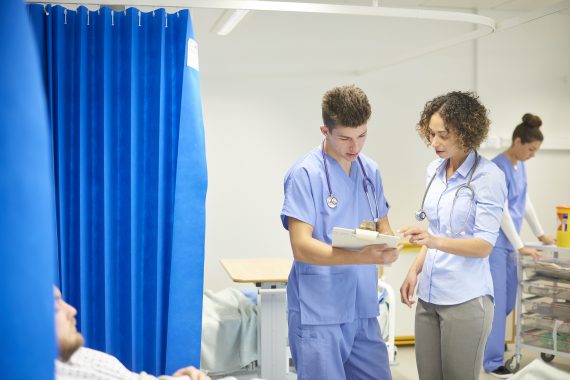GPs to be notified of hospitals’ patient surgery catch-up plans

GPs are to be contacted by hospitals about plans to deal with patients waiting for surgery, NHS England has said.
NHS England said patients on surgical waiting lists will be ‘given the choice between having surgery/treatment (where required) and postponing this’.
It said the project, which will see patients contacted by 23 October, is ‘not an exercise to reduce numbers on waiting lists’.
As part of the ‘third phase’ of the NHS response to coronavirus, hospitals were last month asked to review and ‘clinically prioritise’ waiting lists for elective surgery – with further guidance on the prioritisation of diagnostics and outpatient appointments to follow.
In its latest GP email bulletin, NHS England said hospitals must now contact all patients ‘on an admitted pathway’ to establish their ‘preferred next steps’ and notify the patient’s GP practice of the outcome.
The bulletin said: ‘The priority is to contact all patients on an admitted pathway by 23 October 2020 to establish their wishes about their preferred next steps.
‘The patient’s GP practice will be notified of the outcomes of discussions regarding their procedure.’
It added: ‘This project is centred around making the best mutually agreed decisions with patients regarding their treatment and is not an exercise to reduce numbers on waiting lists.’
In new guidance for hospitals published last week, NHS England said hospitals must check on the patient’s condition and establish ‘any additional risk factors’ as well as their wishes regarding treatment.
They must also allow patients to postpone surgery but remain on the waiting list and provide ‘good communication’ with the patient, carer and GP, it added.
It said: ‘Most long-waiting patients on the surgical waiting list will have agreed to undergo operative treatment before the coronavirus pandemic started. Many people’s circumstances may have changed as a result of the pandemic or other factors since then, and some patients may now have changed their minds about having surgery or wish to defer this until the pandemic is over.
‘Similarly, some people’s condition may have changed, which they may not have wanted to inform their GP or specialist about.’
It added: ‘Patients will be given the choice between having surgery/treatment (where required) and postponing this, if they prefer to wait. Patients will also be offered the option of alternative treatments where appropriate.’
However, GP leaders warned of ‘barriers’ to effective collaboration between primary and secondary care in dealing with the ‘backlog of care’.
In a new report published last week, the BMA said: ‘Since the start of the pandemic earlier this year, there has been a significant reduction in non-Covid care and activity within the NHS and private sector, with elective procedures cancelled, outpatient attendances down and fewer urgent cancer referrals.
‘The NHS – whilst pre-Covid was already struggling to deal with increased activity, capacity constraints and financial pressures – is now facing a huge uphill struggle to deal with the inevitable backlog of care that has developed since March.’
But it highlighted ‘a number of pre-existing barriers’ including high workload, the need to adapt physical spaces to prevent the spread of infection, lack of joined-up IT, historic workforce shortages and ‘a lack of consistent communication and trust’ between different parts of the health system.
Key recommendations of the report include:
- Bringing together local clinicians to establish a local approach for how to review and process the backlog of referrals, helping to achieve effective prioritisation;
- Developing locally-agreed joint prescribing budgets and open access to electronic prescribing to secondary care clinicians to enable them to issue prescriptions more easily using community pharmacy and so reduce GP workload; and
- Further CCG commissioning of locally–based services for blood tests, ECG, spirometry, ultrasound or other diagnostic services in the community, allowing clinicians to book these tests and monitor results regardless of the setting they work in.
It comes as NHS England last week revealed that GPs will soon be able to refer patients directly for diagnostic tests at new community diagnostic hubs.
Researchers have found that the number of new diagnoses of common conditions in primary care has halved during the height of the pandemic – leading to a potential ‘rebound’ in workload as patients come forward.
And NHS England said last month that GPs should use advice and guidance services to keep patients away from hospital.
Meanwhile, GPs have been told that patients may need to re-take blood tests, following the news broken by Pulse that doctors had been told to only send through ‘urgent’ tests to labs amid ‘a national reagent shortage’.
Pulse October survey
Take our July 2025 survey to potentially win £1.000 worth of tokens

Related Articles
READERS' COMMENTS [1]
Please note, only GPs are permitted to add comments to articles











I wonder how many will be removed from waiting lists when they don’t respond to the letter and will then need rereferring?